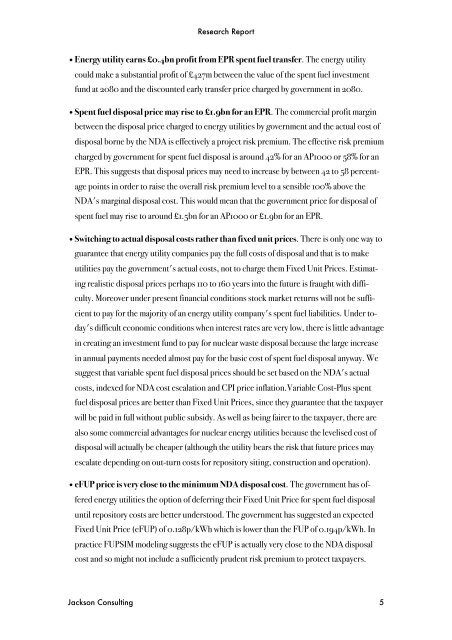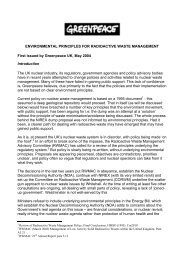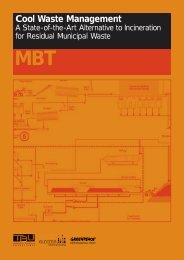fixed unit price simulation for disposal of spent fuel ... - Greenpeace UK
fixed unit price simulation for disposal of spent fuel ... - Greenpeace UK
fixed unit price simulation for disposal of spent fuel ... - Greenpeace UK
Create successful ePaper yourself
Turn your PDF publications into a flip-book with our unique Google optimized e-Paper software.
Research Report<br />
•Energy utility earns £0.4bn pr<strong>of</strong>it from EPR <strong>spent</strong> <strong>fuel</strong> transfer. The energy utility<br />
could make a substantial pr<strong>of</strong>it <strong>of</strong> £427m between the value <strong>of</strong> the <strong>spent</strong> <strong>fuel</strong> investment<br />
fund at 2080 and the discounted early transfer <strong>price</strong> charged by government in 2080.<br />
•Spent <strong>fuel</strong> <strong>disposal</strong> <strong>price</strong> may rise to £1.9bn <strong>for</strong> an EPR. The commercial pr<strong>of</strong>it margin<br />
between the <strong>disposal</strong> <strong>price</strong> charged to energy utilities by government and the actual cost <strong>of</strong><br />
<strong>disposal</strong> borne by the NDA is effectively a project risk premium. The effective risk premium<br />
charged by government <strong>for</strong> <strong>spent</strong> <strong>fuel</strong> <strong>disposal</strong> is around 42% <strong>for</strong> an AP1000 or 58% <strong>for</strong> an<br />
EPR. This suggests that <strong>disposal</strong> <strong>price</strong>s may need to increase by between 42 to 58 percentage<br />
points in order to raise the overall risk premium level to a sensible 100% above the<br />
NDA's marginal <strong>disposal</strong> cost. This would mean that the government <strong>price</strong> <strong>for</strong> <strong>disposal</strong> <strong>of</strong><br />
<strong>spent</strong> <strong>fuel</strong> may rise to around £1.5bn <strong>for</strong> an AP1000 or £1.9bn <strong>for</strong> an EPR.<br />
•Switching to actual <strong>disposal</strong> costs rather than <strong>fixed</strong> <strong>unit</strong> <strong>price</strong>s. There is only one way to<br />
guarantee that energy utility companies pay the full costs <strong>of</strong> <strong>disposal</strong> and that is to make<br />
utilities pay the government's actual costs, not to charge them Fixed Unit Prices. Estimating<br />
realistic <strong>disposal</strong> <strong>price</strong>s perhaps 110 to 160 years into the future is fraught with difficulty.<br />
Moreover under present financial conditions stock market returns will not be sufficient<br />
to pay <strong>for</strong> the majority <strong>of</strong> an energy utility company's <strong>spent</strong> <strong>fuel</strong> liabilities. Under today's<br />
difficult economic conditions when interest rates are very low, there is little advantage<br />
in creating an investment fund to pay <strong>for</strong> nuclear waste <strong>disposal</strong> because the large increase<br />
in annual payments needed almost pay <strong>for</strong> the basic cost <strong>of</strong> <strong>spent</strong> <strong>fuel</strong> <strong>disposal</strong> anyway. We<br />
suggest that variable <strong>spent</strong> <strong>fuel</strong> <strong>disposal</strong> <strong>price</strong>s should be set based on the NDA's actual<br />
costs, indexed <strong>for</strong> NDA cost escalation and CPI <strong>price</strong> inflation.Variable Cost-Plus <strong>spent</strong><br />
<strong>fuel</strong> <strong>disposal</strong> <strong>price</strong>s are better than Fixed Unit Prices, since they guarantee that the taxpayer<br />
will be paid in full without public subsidy. As well as being fairer to the taxpayer, there are<br />
also some commercial advantages <strong>for</strong> nuclear energy utilities because the levelised cost <strong>of</strong><br />
<strong>disposal</strong> will actually be cheaper (although the utility bears the risk that future <strong>price</strong>s may<br />
escalate depending on out-turn costs <strong>for</strong> repository siting, construction and operation).<br />
•eFUP <strong>price</strong> is very close to the minimum NDA <strong>disposal</strong> cost. The government has <strong>of</strong>fered<br />
energy utilities the option <strong>of</strong> deferring their Fixed Unit Price <strong>for</strong> <strong>spent</strong> <strong>fuel</strong> <strong>disposal</strong><br />
until repository costs are better understood. The government has suggested an expected<br />
Fixed Unit Price (eFUP) <strong>of</strong> 0.128p/kWh which is lower than the FUP <strong>of</strong> 0.194p/kWh. In<br />
practice FUPSIM modeling suggests the eFUP is actually very close to the NDA <strong>disposal</strong><br />
cost and so might not include a sufficiently prudent risk premium to protect taxpayers.<br />
Jackson Consulting 5




![[2007] EWHC 311 - Greenpeace UK](https://img.yumpu.com/22079793/1/184x260/2007-ewhc-311-greenpeace-uk.jpg?quality=85)












